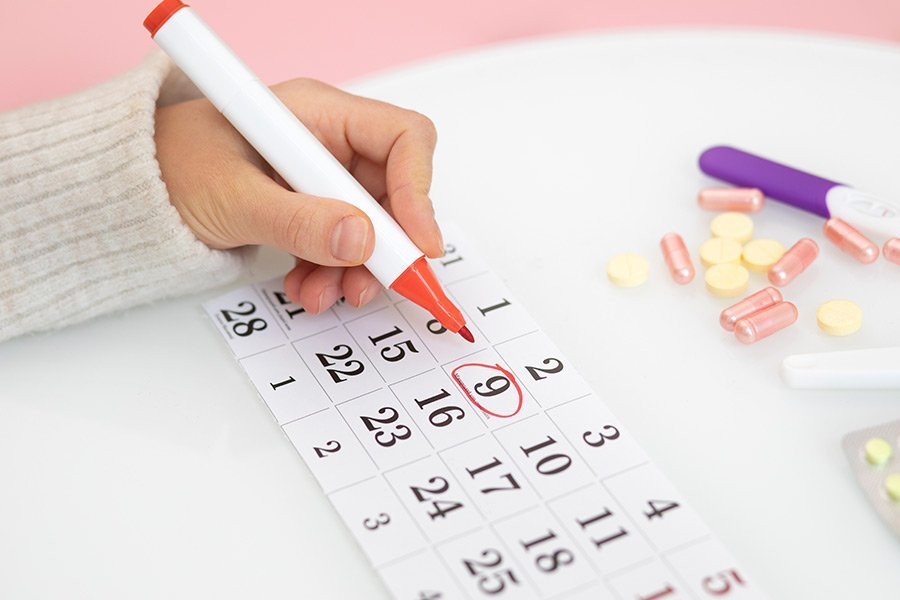How Late is My Period? Understanding Delays and What’s Normal

It’s common to be worried when your period doesn’t arrive on time. Most menstrual cycles are 24 to 30 days. However, they can also be as long as 38 days, which makes it harder to decide when to consider them delayed. Many factors can affect your menstrual cycle, and while a late period often isn’t a cause for alarm, understanding the potential reasons can help ease your mind. Let’s explore the answers to questions like, “how late is my period?” and period how many days late is normal?”
How Many Days Late is Normal for a Period?
The average menstrual cycle lasts between 21 and 35 days, with a typical period arriving every 28 days. However, variations are common. A period can be considered late if it’s more than 7 days past its expected start date, but this depends on your typical cycle length. If your cycle is irregular, you may experience occasional late periods without any serious underlying issue. Factors such as stress, changes in weight, or hormonal fluctuations can cause these shifts [1].
So, how late is normal for a period? A delay of up to 7 days is usually normal for most women, especially if your cycle isn’t always consistent. This variability can happen due to many reasons, including stress, illness, diet changes, or increased physical activity. If your period is consistently irregular or late by more than a week, it may be worth discussing with a healthcare provider.
What Causes a Late Period?
Several factors can contribute to a delayed period. Let’s understand in detail what can cause cycle delays:
- Early Pregnancy Symptoms: Missing a period is often one of the first signs of pregnancy. If your period is more than a week late and you are sexually active, it might be time to take a pregnancy test.
- Stress: Emotional or physical stress can affect your hormones, particularly the hypothalamus, which regulates your menstrual cycle. Over time, this can lead to a missed or late period [2].
- Weight Fluctuations: Sudden changes in weight, whether gain or loss, can impact your cycle. Being underweight or overweight can disrupt the delicate balance of hormones that control menstruation.
- Polycystic Ovary Syndrome (PCOS): PCOS is a condition that affects hormone levels, leading to irregular periods or even missed cycles. If you frequently experience late or missed periods, talk to your doctor about testing for PCOS.
- Thyroid Conditions: Both an underactive (hypothyroidism) and overactive (hyperthyroidism) thyroid can lead to irregular or late periods. The thyroid plays a crucial role in regulating your hormones, which can, in turn, affect your menstrual cycle.
- Perimenopause: If you’re in your 40s or 50s, perimenopause, the transition into menopause, could be the cause of a delayed period. Menstrual cycles can become more irregular during this phase.
Should I Be Worried About a Late Period?
If your period is only late by a few days, it’s usually not something to worry about. However, if you’ve missed more than three consecutive periods, it’s recommended to seek medical advice. This could be an indication of an underlying health condition, such as PCOS, thyroid disorders, or even early menopause. Additionally, if you’re experiencing other symptoms like unexpected weight changes, hair growth, or fatigue, you should consult a healthcare provider.
Tracking Your Cycle
Tracking your cycle can help you determine what is “normal” for your body and identify any irregularities early. Using apps or calendars to note the start and end dates of your period can help you recognize patterns and detect if your period is abnormally late.
The Bottom Line
How late is normal for period? While a few days’ delay is common and typically not cause for concern, persistent irregularity could signal a health issue. Understanding the range of normal variations and the potential causes of a late period can help you manage your cycle better. If your period is more than a week late and doesn’t follow its usual pattern, it’s best to consider taking a pregnancy test or seeking advice from a healthcare provider.
If you're asking how late is my period, it’s important to track your cycle consistently to spot any unusual delays or patterns.
Sources
- Reed BG, Carr BR. The Normal Menstrual Cycle and the Control of Ovulation. [Updated 2018 Aug 5]. In: Feingold KR, Anawalt B, Blackman MR, et al., editors. Endotext [Internet]. South Dartmouth (MA): MDText.com, Inc.; 2000-. Available from: https://www.ncbi.nlm.nih.gov/books/NBK279054/
- Nicole Galan, RN, Debra Rose Wilson, Ph.D. Eight possible causes of a late period. [January 15, 2020].MedicalNewsToday. Available online: https://www.medicalnewstoday.com/articles/318317













